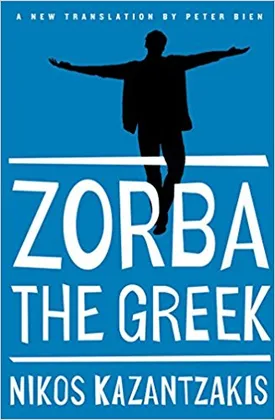Nikos Kazantzakis
Nikos Kazantzakis (1883-1957) is one of Greece’s most acclaimed and prolific authors. Born to a middle class family in Crete, he led a life of travels and wrote extensively on a wide variety of topics, from literature and philosophy to religion and politics. His works express his personal search for meaning, as well as his indignation towards constraints of any kind, intellectual and otherwise.
Originally trained in the sciences, Kazantzakis initially planned to become a doctor. However, a visit to Paris during his twenties led him away from an academic career, as he was exposed to the culture and writers of the time. He eventually moved to Athens, where he studied law, philosophy, and comparative literature. That same year, he published his first work of fiction, The Odyssey, an epic poem that retold Homer’s classic in a modern context.
In 1923, the publication of his second novel Kapetan Michalis was met with critical acclaim and labeled him, in the words of a prominent Athenian critic, as “the most powerful and original writer of our time.” His works began to be seen as daring and thought-provoking, largely because of his ability to challenge existing social conventions and existing ideologies. Kazantzakis sought through his works to delve into human consciousness, exploring the ramifications of its evolution in an ever-changing world.
Kazantzakis’ best-known work is his novel Zorba the Greek, which was made into a popular movie starring Anthony Quinn. In this tale, a young writer travels to Crete with a copy of Homer’s epic poem The Odyssey. There, he meets the charismatic Alexis Zorba, who takes him on a journey of discovery that leads him to a deep understanding of life’s struggles and ultimate joys.
Kazantzakis also wrote several plays and essays, the most substantial of which are The Walls of Byzantium, The Saviors of God, and The Last Temptation of Christ. In the latter, Kazantzakis continues the exploration of the struggle between physical reality and spiritual freedom. He questions the practices of organized religion to the point that it bemused his readers and provoked the ire of the Catholic Church, which deemed the book blasphemous.
Kazantzakis’ legacy lies in his inspiring exploration of human subjectivity and its search for new forms of meaning and moments of joy. He wrote of grand social and spiritual themes, of political and spiritual turmoil, and of the eternal spirit of freedom and justice for all. He remains one of the foremost figures in modern Greek literature, influencing the works of numerous other authors.

